Intel Core i9 11900K review | PC Gamer - fullerarinue
Our Verdict
A startlingly unnecessary CPU, one that only serves Intel's own designs and not actual PC gamers. Its glasses feel weaker than the endure-gen flagship, it's Thomas More expensive, and has a thirstier core at its 14nm heart.
For
- Unlocked near along par with 10900K
- Slenderly faster gaming fps than AMD
Against
- Stupid PCIe 4.0 performance
- Core i9 specs downgrade
- Unnecessarily expensive
PC Gamer Finding of fact
A startlingly unnecessary CPU, one that merely serves Intel's own designs and not actual PC gamers. Its specs feel weaker than the last-gen flagship, it's more expensive, and has a thirstier core at its 14nm warmheartedness.
Pros
- +
Unlocked almost on par with 10900K
- +
Slightly faster gaming Federal Protective Service than AMD
Cons
- -
Frail PCIe 4.0 public presentation
- -
Core i9 specs downgrade
- -
Unnecessarily expensive
This isn't the Intel Core i9 11900K we were supposed to have. The very heart of this processor is fundamentally different from the one and only that was meant to have beat out a rhythm for Intel's 11th Gen Essence CPUs, and that, in the end, is wherefore I doubt anyone will feel comfy recommending this nominally $539 CPU. I sure as shooting don't.
The Projectile Lake range of CPUs was in trouble from its inception, and that rings especially unfeigned for the Core i9 11900K equally the flagship chip of this recently generation of background processors. From the very first decision to make up this rigid of CPUs, Rocket Lake was always on the back foot, because Intel's bankruptcy is the only reason for its beingness.
Tiger Lake. That's what we should be writing more or less when it comes to this 11th Gen serial. That's what we're doing along the rotatable side of Intel's clientele, even the high-performance, gaming-focused chips that are coming unsuccessful afterwards in the year. But, as an alternative of that continuation of the 10nm production process into desktop form, Rocket Lake is some other 14nm chip, but unmatched that is trying to take the previous 10nm inwardness design and fit it into 14nm silicon.
Information technology's not quite an square peg in a round LGA socket, but it's the reasonableness wherefore Rocket Lake is such a jarring Central processor generation at the top end.
Architecture
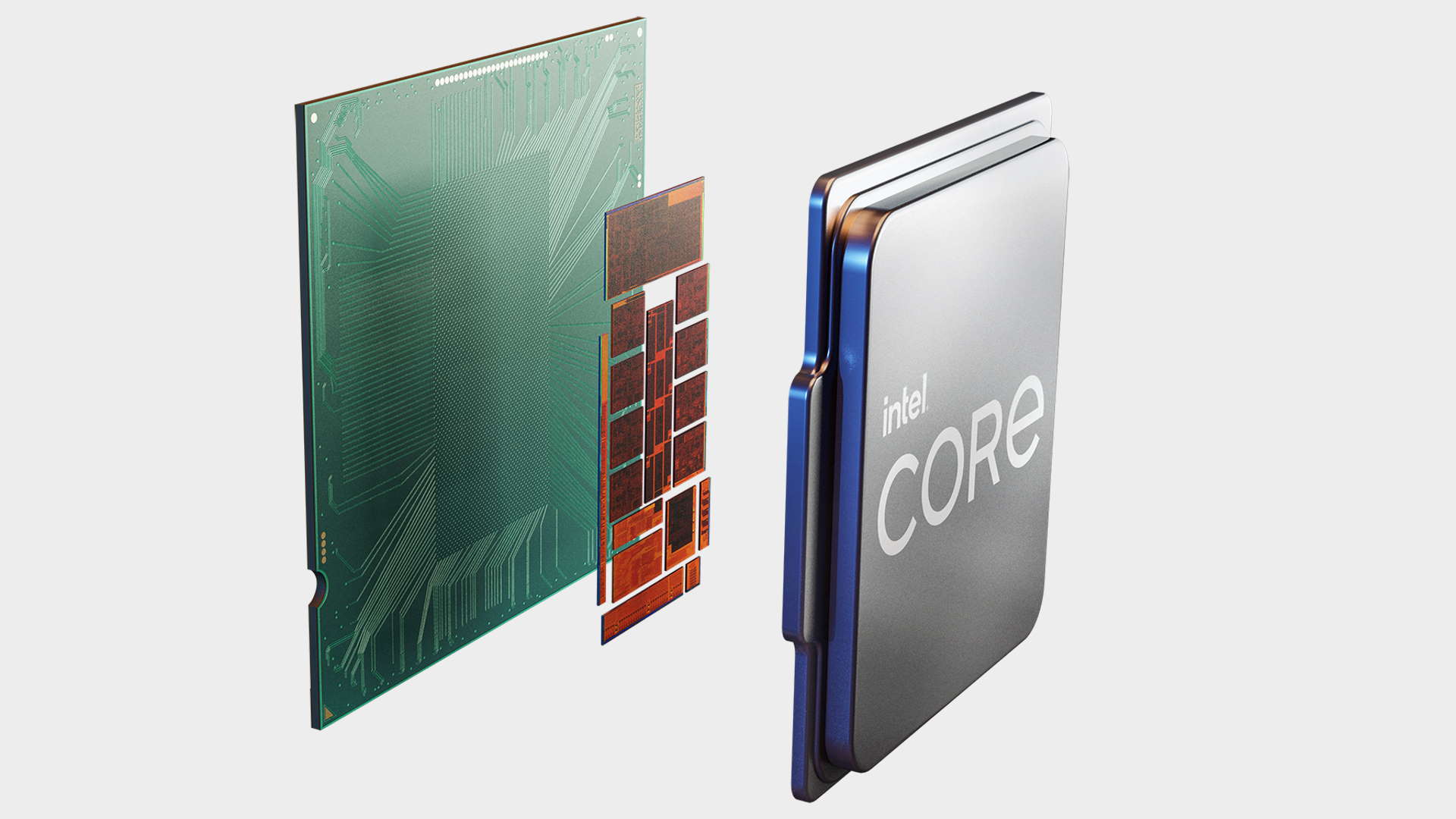
What's different virtually the Intel Core i9 11900K
The first thing to note is that Rocket Lake isn't Tiger Lake's 10nm heart and soul back-ported into a 14nm CPU box. The Cypress Cove inwardness architecture that powers the Core i9 11900K is essentially the Sunny Cove design squeezed into a flake that can tally in the aforementioned socket as the yellow Comet Lake Nub i9 10900K. That was the 10nm intent secondhand in the Ice Lake multiplication of laptop computer CPUs, while Tiger Lake uses a further refined Willow Cove core, one with energizing transistors optimisations, a redesigned cache system, and higher IPC.
The second thing to note is why a back-port was needed in the prime place, and this is something for which I still harbour't got a satisfactory resolve out of Intel.
There's zipp more Intel rump extrude of the geriatric Skylake core
The basic situation is that Intel's shift to broader 10nm manufacturing has been importantly impacted by output issues, first around the first Cannon Lake chips—which barely made it proscribed of the fabs—and constrained by farther afford problems with the subsequent Frosting Lake design. Neither CPU architecture was then capable of pushing the high frequencies required of Bodoni font screen background processors and so those remained stuck on the 14nm node, and happening modest iterations of the freehand Skylake core design from 2015.
But Intel couldn't spin out another version of the 14nm Skylake architecture for its past 2021 chip release if it loved to catch equal to AMD's excellent Ryzen 5000-serial CPUs. The latest Zen 3 CPUs have either caught up to, or surpassed, Intel's comparative processors when it comes to gaming carrying into action, and there's really nothing more Intel can eke out of the medical specialty Skylake core to force out ahead.
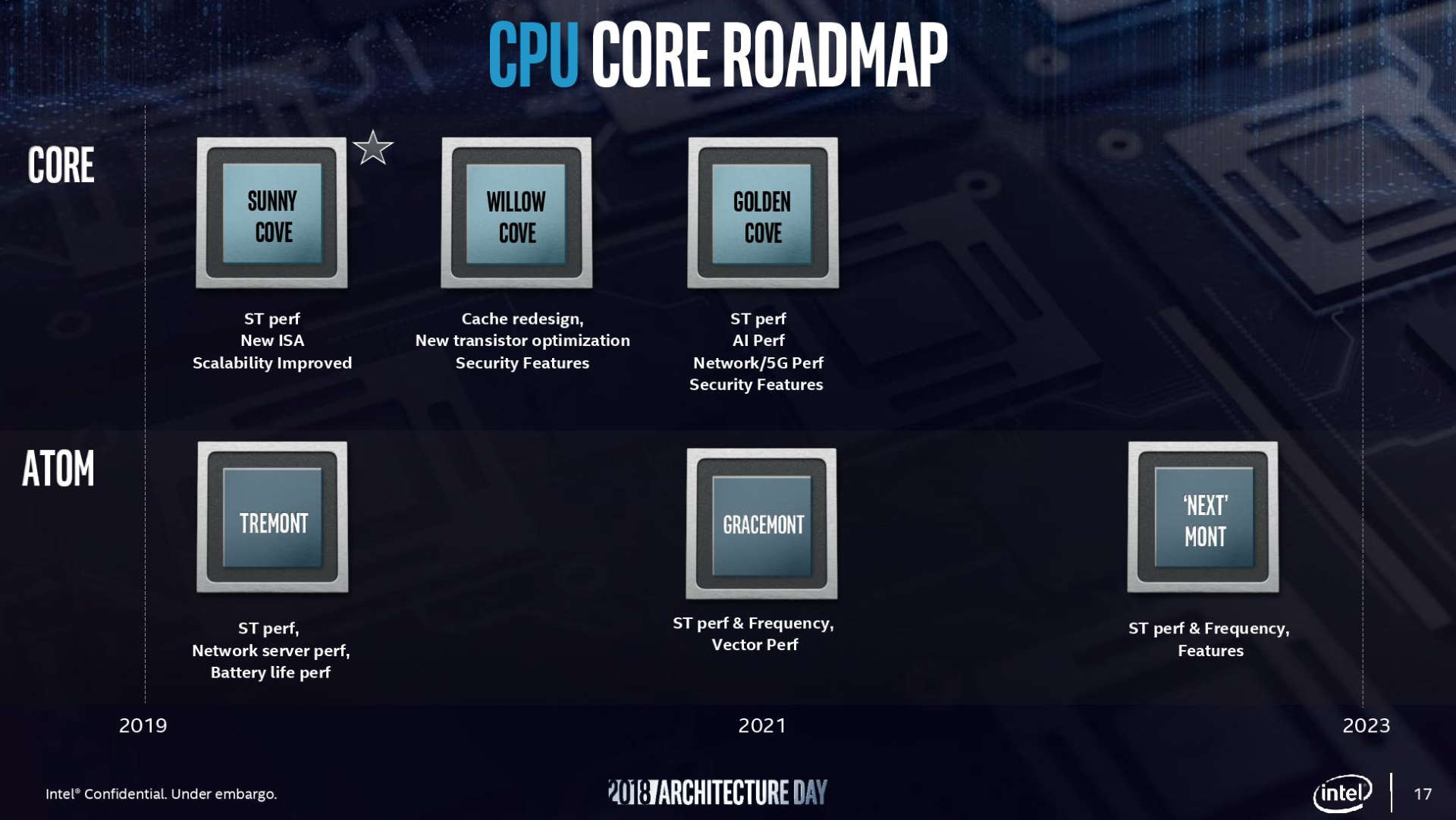
So the decision was made to bring the Clear Cove designing into one final 14nm CPU range, thus Eruca sativa Lake was born. This would have apt been made spell the Willow Cove core for Tiger Lake was being finalised and then the latest 10nm pattern was probably never really considered for the 11th Gen desktop architecture.
This wouldn't have been a decision Intel took lightly; there volition always be sacrifices engineers have to make ready to revise such a core for 14nm production. The most transparent of which concerns space. The problem is that, spell a 10nm CORE fanny be small than a 14nm design if it's essentially the same, just on a smaller thickening, Sunny Cove, and past extension Cypress Cove, are different. Intel originally old the more diminutive appendage to jam much logic into the cores and the result is that by exit back the engineers have had to weighing machine back the Nucleus i9 flake.
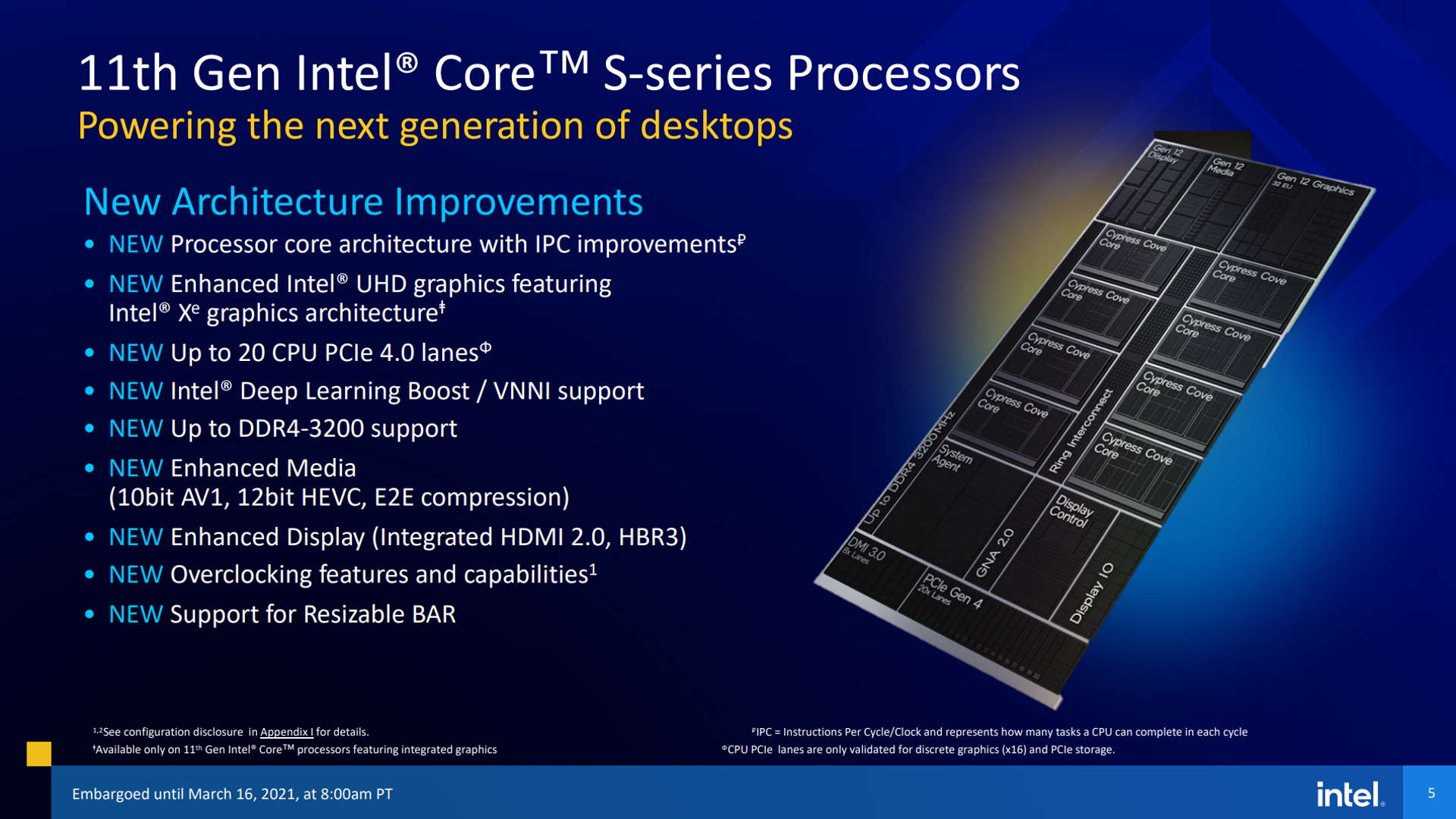
The most noteworthy casualty is the core count. There was no way for Intel to maintain the cookie-cutter ten-core design As the i9 10900K with the fatter Cypress tree Cove cores and still be able to harmonize the revolutionary Xe GPU. Why get to if we're barely going to be husky discrete graphics card game to these CPUs anyway? Well, at that place's a large industry for Intel in shipping chips bent corporate clients which rely solely on the integrated nontextual matter of its processors and IT would be too expensive to manufacture wholly different cores.
There are stock-still F-series Arugula Lake chips that lack integrated graphics, simply those simply have out of action GPU cores, and aren't different CPUs with a col where the 32EU Xe silicon should be.
The big idea behind Cypress Cove is the same as Shining Cove: Deeper, Wider, Smarter. There is a greater amount of memory cache at different levels of the chip, with more L1 Information hive up and more L2 cache than with Skylake.
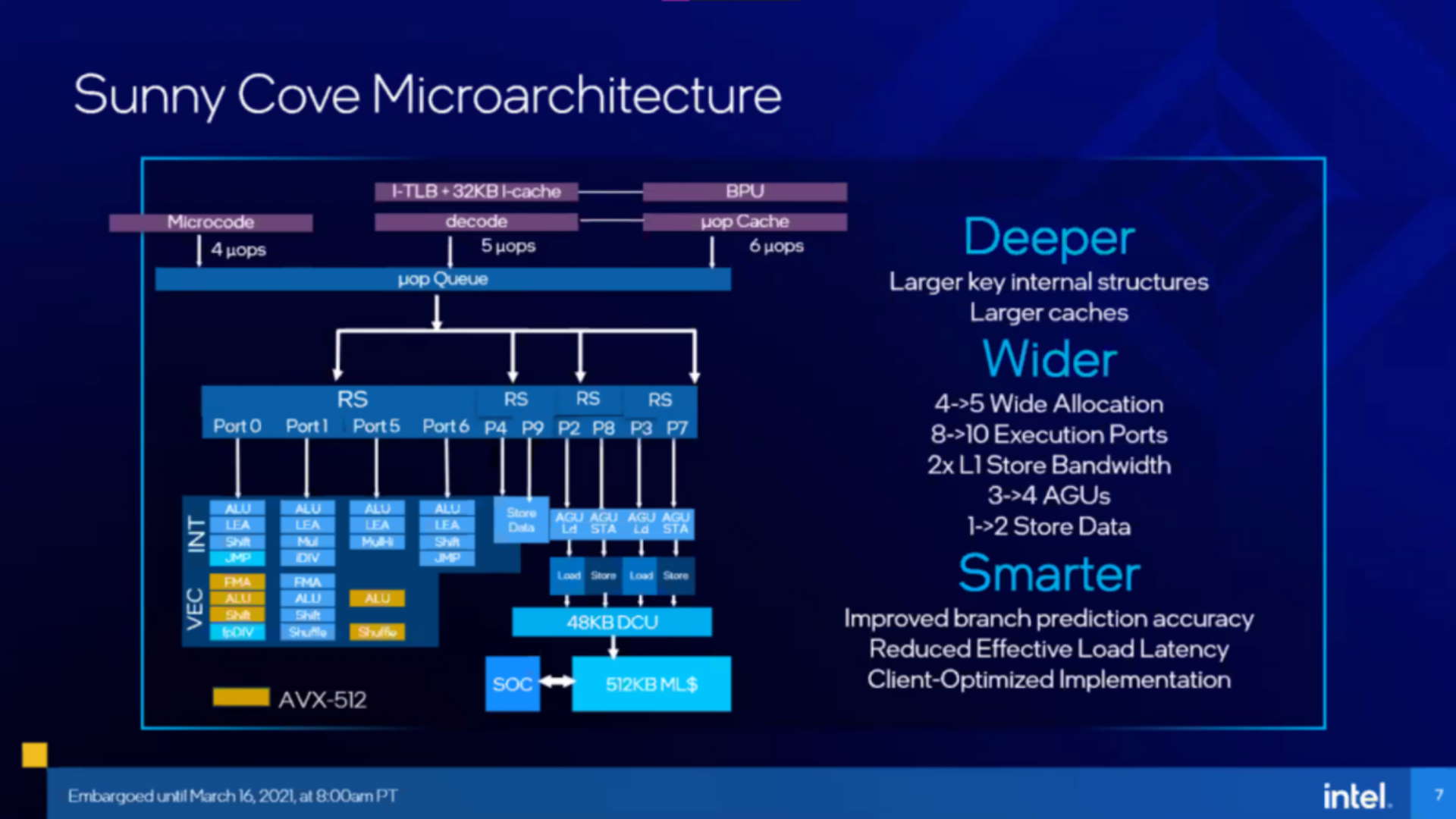
There's still the Lapplander 2MB of L3 cache per core, so that 'Chic Cache' number doesn't change with Rocket Lake. Intel has also broadened some key facets of the microarchitecture too, but we'll start acquiring into names of things that USA PC gamers likely don't need to worry overmuch about, much Eastern Samoa reorder buffers and execution ports. Suffice to say on that point are more of them.
And the end result is an architecture which delivers higher didactics per clock performance—which Intel is claiming at around 19 percentage ended Comet Lake—a hardware fix to the security flaws (such as Meltdown), more PCIe lanes from the Mainframe (and those running at PCIe 4.0 speeds), and greater memory speed.
It's an obviously big chip design compared with the last-gen Comet Lake CPUs, thanks to having to expand to 14nm. Only that scale up doesn't fair-minded bear upon the physical size, it has an obvious effect on the amount of power the fewer-efficient process demands. Concisely, Arugula Lake is thirsty. And that's another compromise Intel's engineers have had to hold with the Substance i9 11900K, the Sunny Cove back-port, and its slightly increased adaptation of the 14nm+++ thickening.
Specs
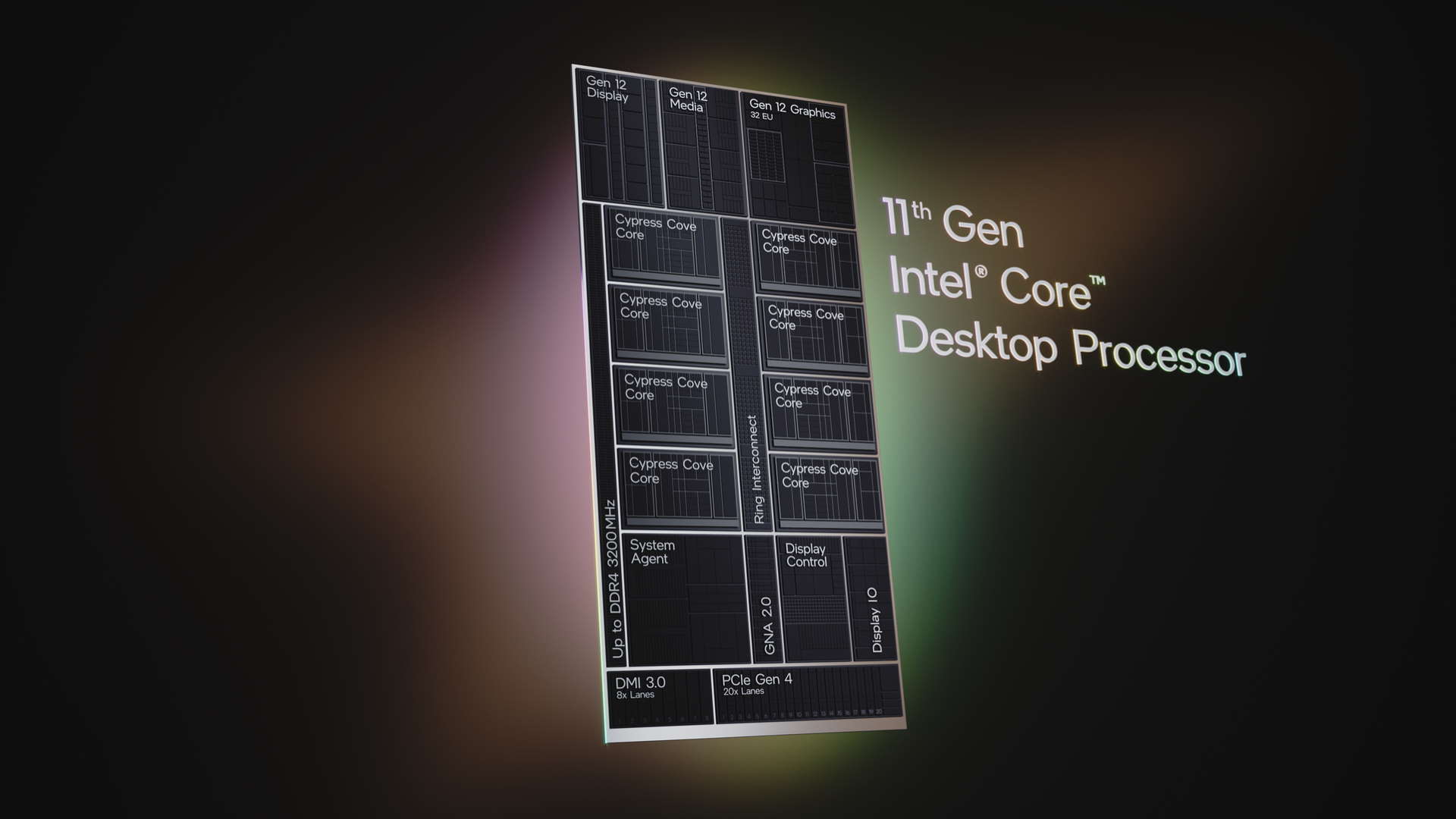
What's privileged the Intel Core i9 11900K?
Equally the flagship processor of the Rocket Lake lineup the Effect i9 11900K is all that the 11th Gen desktop can be. Which is to say a nominal downgrade on the best of the 10th Gen chips. The key spec for the i9 11900K is the core-count, and at eight cores and 16 threads that's take down than the cheaper i9 10900K. That's loss to live a tough sell for Intel this clock around.
Core i9 11900K glasses
Cores: 8
Togs: 16
Illegitimate clock: 3.5GHz
All-core boost: 4.7GHz
Single-nitty-gritty advance: 5.3GHz
Smart cache: 16MB
TDP: 125W
Memory support: DDR4-3200
Price: $539
In terms of clock speed, we're also sounding at a chip that's slower than its last-gen brethren. Its peak of 5.3GHz is the same as the i9 10900K, and matches information technology by also being mostly impotent to actually blast that travel rapidly for more than a pico-second present and at that place. The base absolute frequency, however, is lower, which scarcely matters either. The top and posterior of Intel's frequency numbers game are well-nig irrelevant because you'll never actually see your chip operational at those limits.
What's more probatory is the entirely-nub turbo number, and at 4.7GHz the eight-core Skyrocket Lake chip is over again slower than the 4.8GHz of the ten-inwardness Comet Lake CPU. IT as wel has a tendency to fleetly throttle back to around 4.3GHz thanks to the Intel power limits.
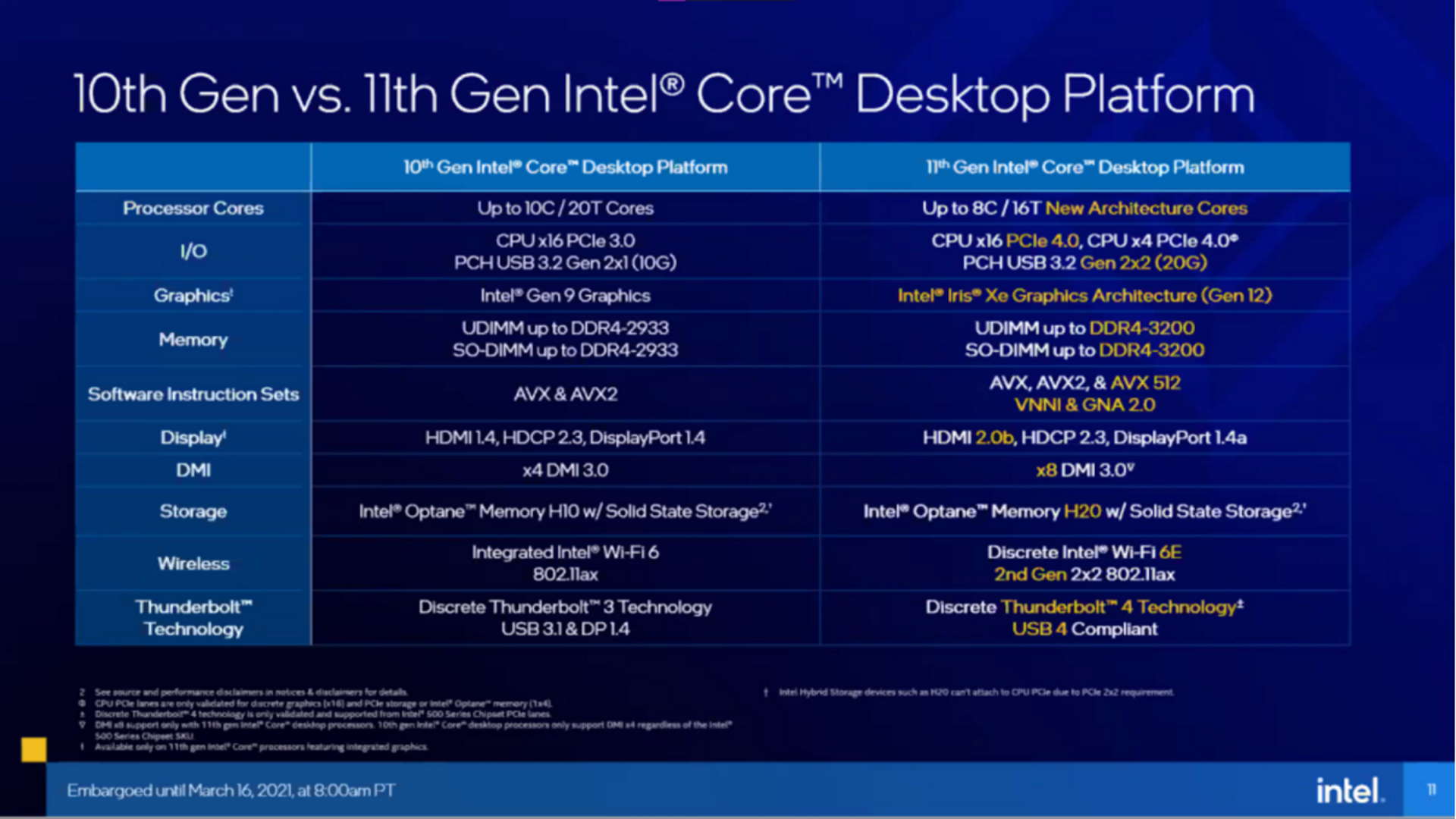
But hey, at least this advanced mainframe can fit in the duplicate LGA 1200 socket equally the 10th Gen CPUs. Though then you'Ra missing out happening the thing that feels the most like a tangible upgrade for Rocket Lake, the PCIe 4.0 support. Now, a hatful of last-gen Z490 motherboards are getting BIOS updates to allow for PCIe 4.0 hold with an 11th Gen CPU, and many have already had them, but Intel has besides released the Z590 chipset with baked in PCIe 4.0 keep.
The Z590 chipset itself, however, is soundless decisively running on PCIe 3.0, making support relieve feel like Intel's only put a sole butt boldness into this. With 20 PCIe 4.0 lanes coming from the Rocket Lake CPU exclusively, there is just enough for a rotund x16 GPU time slot and a single x4 NVMe SSD. Admittedly you can mirthfully run your GeForce RTX 3080 OR Radeon RX 6800 XT on a PCIe 4.0 socket running at x8 speeds as information technology will still have the same bandwidth as a full x16 PCIe 3.0 slot, but information technology is well-nig unquestionably a limitation billowing forward.
The TDP of the Core i9 11900K is the same 125W as the Core i9 10900K, though if you prod a little deeper you'll ascertain that really Eruca vesicaria sativ Lake's transcend eight-core chip has a secondary power limit (PL2 for short bursts of high frequencies) that is high than the ten-core Comet Lake, particularly the stand level where it's 203W versus 177W.
Benchmarks
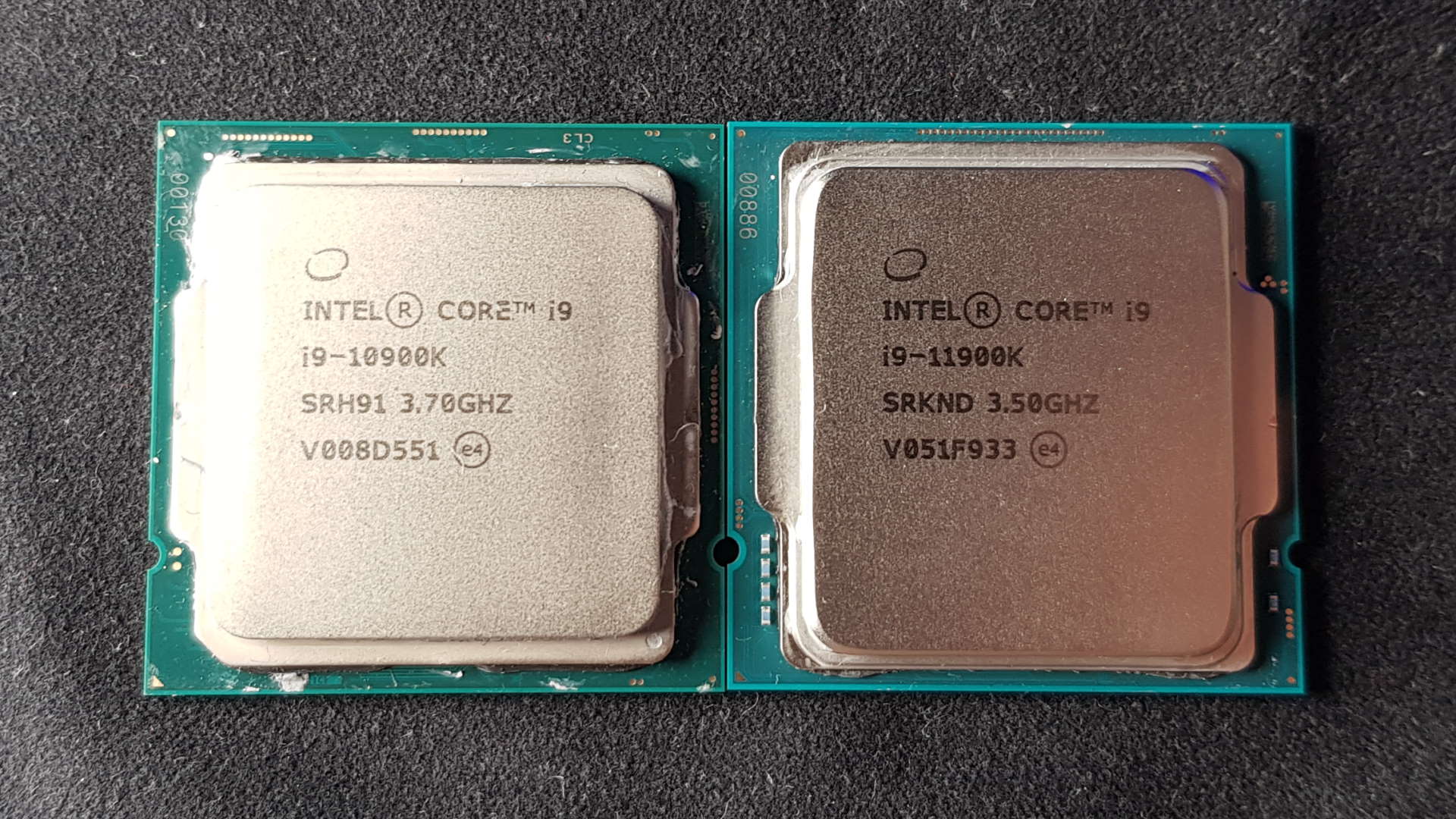
How does the Intel Inwardness i9 11900K do?
You may well have gotten this far through my review curious what the hell the point was for Intel going to all the effort of rearwards-porting Bright Cove to 14nm only to produce what looks equal a worse CPU on paper. After altogether, the effective back-porting process was not an easy affair for the Israel arm of Intel's engineering team to do, and the fact that it has created Rocket Lake at completely is still an fulgurant feat.
The 11900K beats the 5900X, our dearie CPU right now, when it comes to play
Merely it was also important to Intel as a whole, because with the Core i9 11900K it can once more claim to undergo the fastest gaming Central processing unit in the world. Bury the limitations of the cardinal-core design when it comes to multithreading performance against the Effect i9 10900K and AMD's Ryzen 9 5900X—the chips it most closely rivals—because it can outgun them some in games.
Though only by a borderline orthogonal amount, it's still there in benchmark numbers racket, in easy to parse frames per sec figures: The Substance i9 11900K beats the Ryzen 9 5900X, our dearie CPU far-right in real time, when it comes to gaming.
In everything besides Shadow of the Tomb Raider, information technology's only ever by a mere fistful of frames per second. The delta is small enough that you could almost put it down to variance in testing, but IT is so consistently connected the side of the Intel chip that I feel jolly confident in stating that the Core i9 11900K is the many competent of the cardinal. Exclusive the F1 2019 benchmark has the Ryzen 9 5900X with a 4 fps advantage.
Gaming functioning
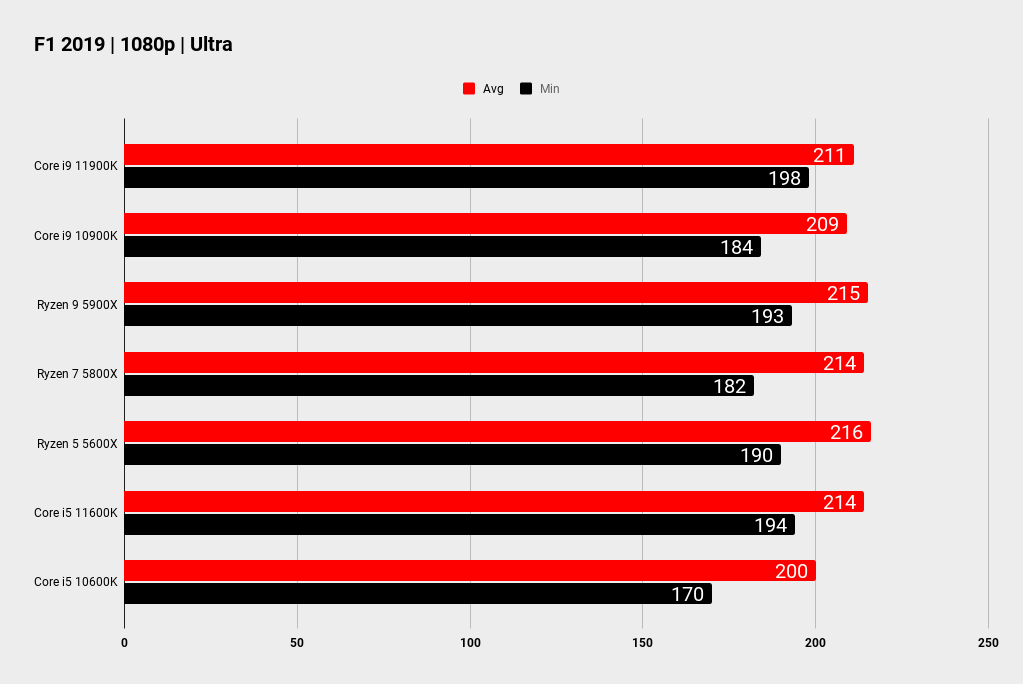
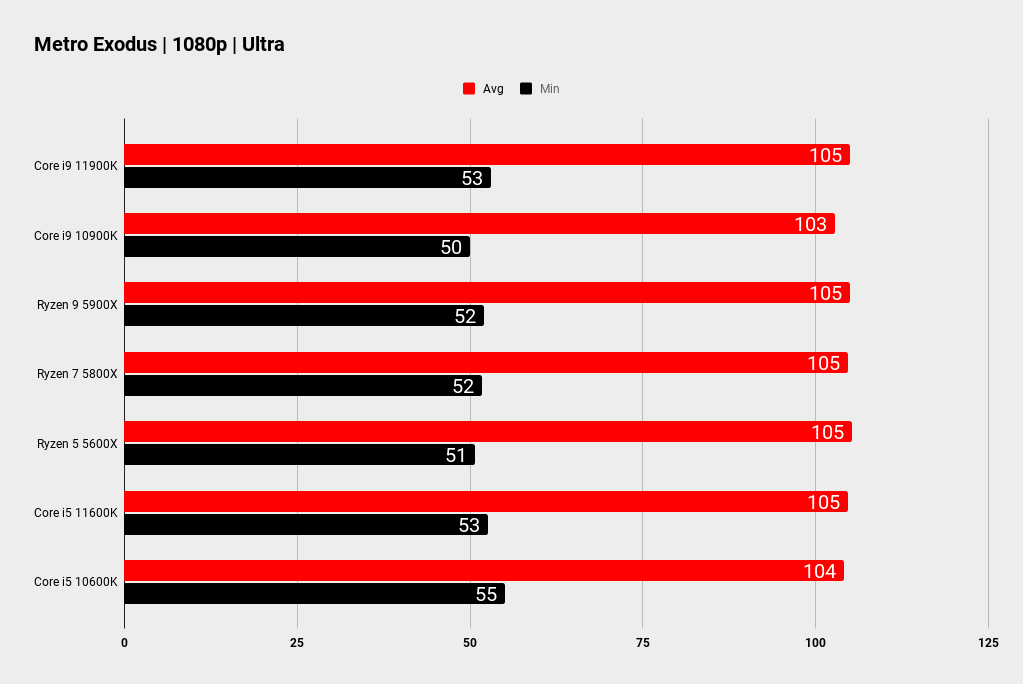
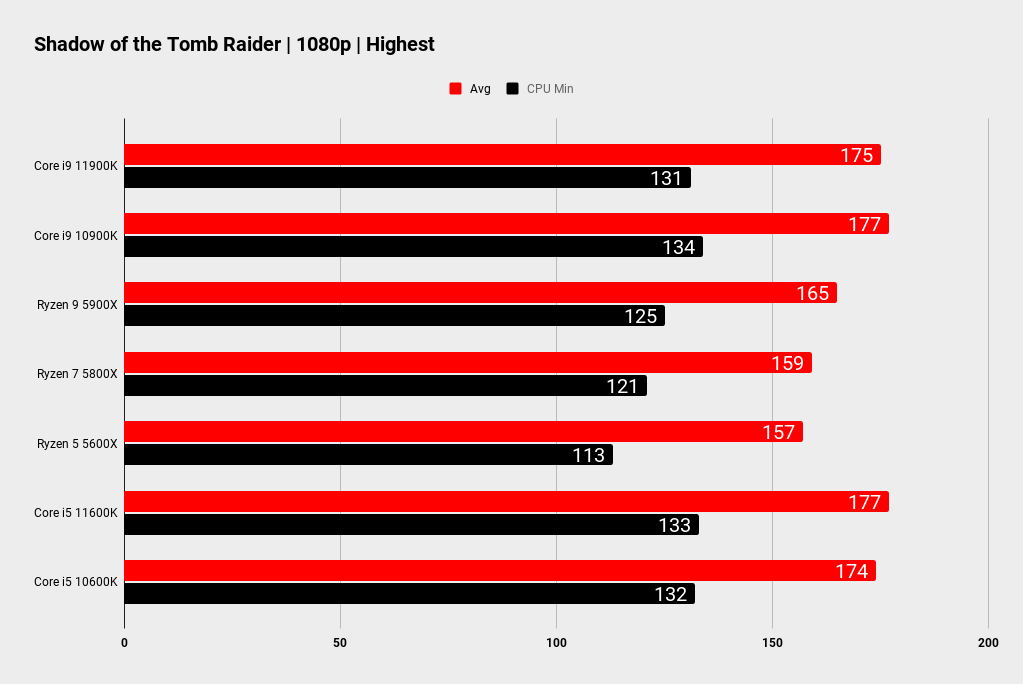
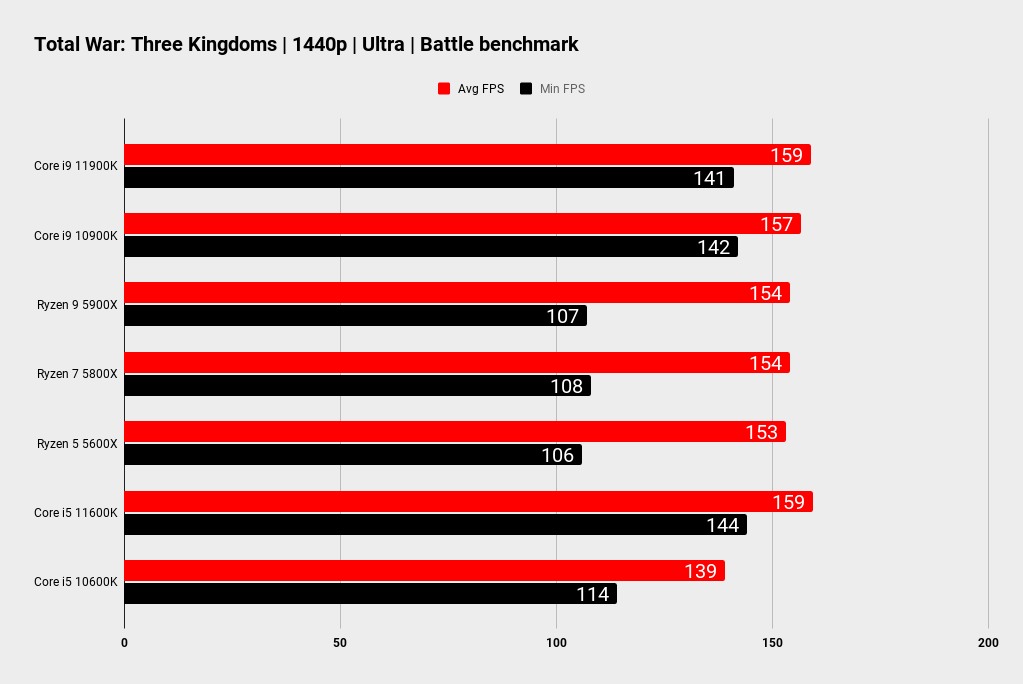
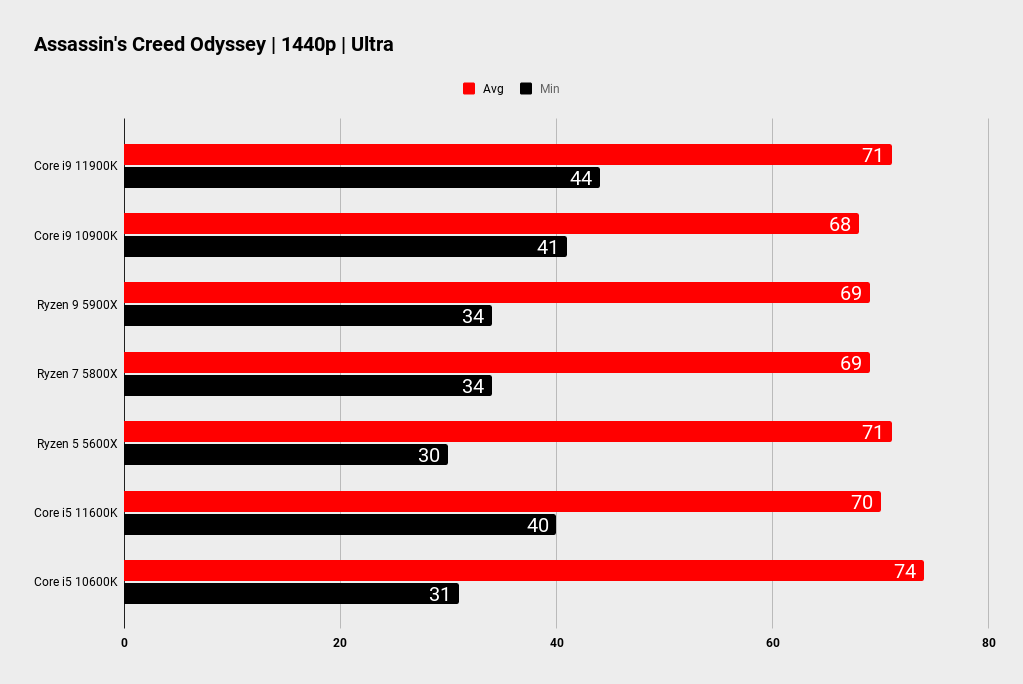
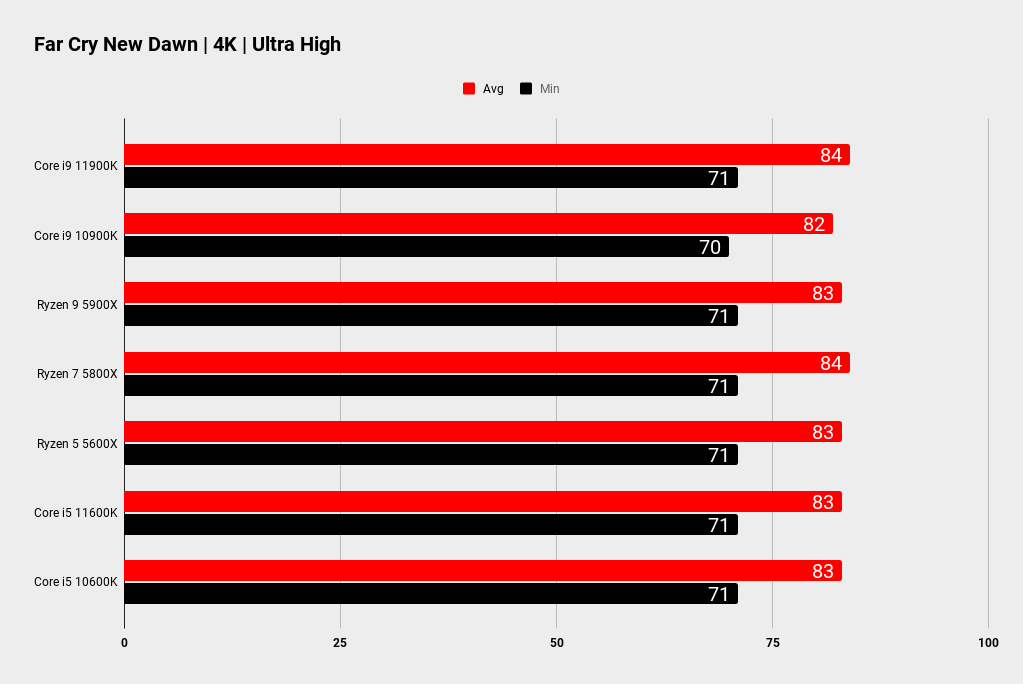
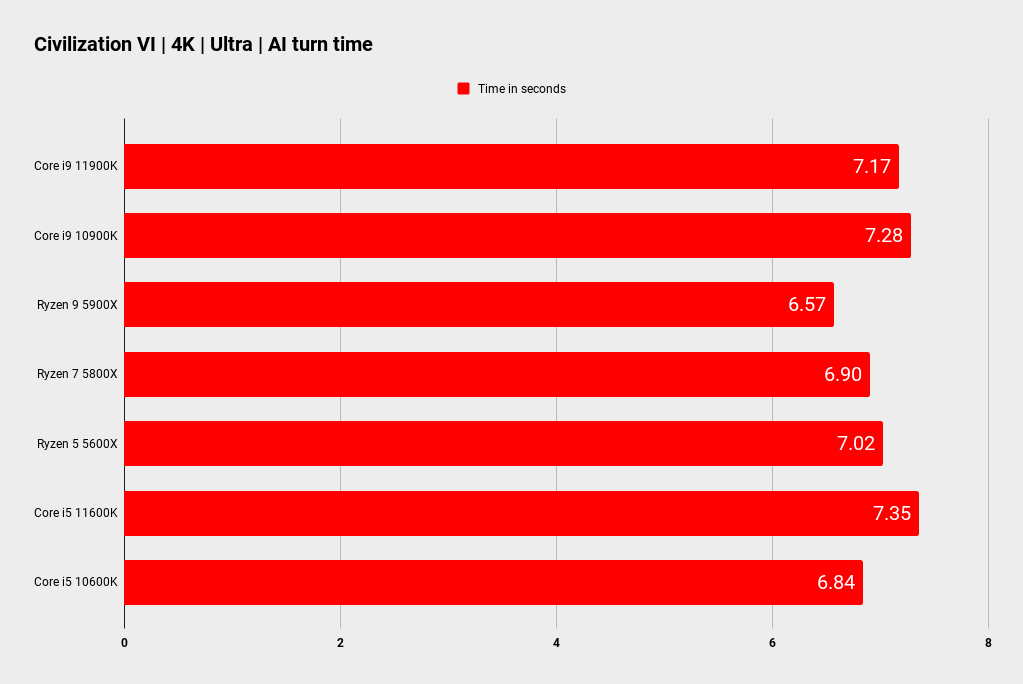
The story is, inevitably, entirely assorted when it comes to literally anything outside of gaming. The Ryzen 9 5900X, and honestly the Core i9 10900K too, is far higher-up when it comes to actual, y'roll in the hay, processing. Obviously, the higher core counts of those cardinal chips give them much greater multithreaded carrying out, and that's born unfashionable by the x264 television encoding and Cinebench interlingual rendition figures. The Ryzen 9 5900X delivers 68 percentage and 45 percent higher scores respectively in those two tests.
Even if you unlock the Intel index limits—which pretty much all Z590 motherboard leave exercise with a unique setting in the BIOS—and enable Adaptive Boost Technology, giving the Congress of Racial Equality i9 11900K all the leash it needs to hang itself, it still falls well short of the equivalently priced Window pane 3 CPU. In fact, even off though that allows IT to stick resolutely to a 5.1GHz all-core clock speed, it's still just behind the Core i9 10900K.
To be indifferent, that does mean that with the Intel shackles removed from the Rocket Lake chip (shackles in that respect to allow Intel to call it a 125W processor) those ogdoad Cypress Cove cores are able to offer almost the same multithreaded performance as the ten Skylake cores of Comet Lake. Which is an impressive, if supremely thirsty effort.
Weapons platform carrying into action
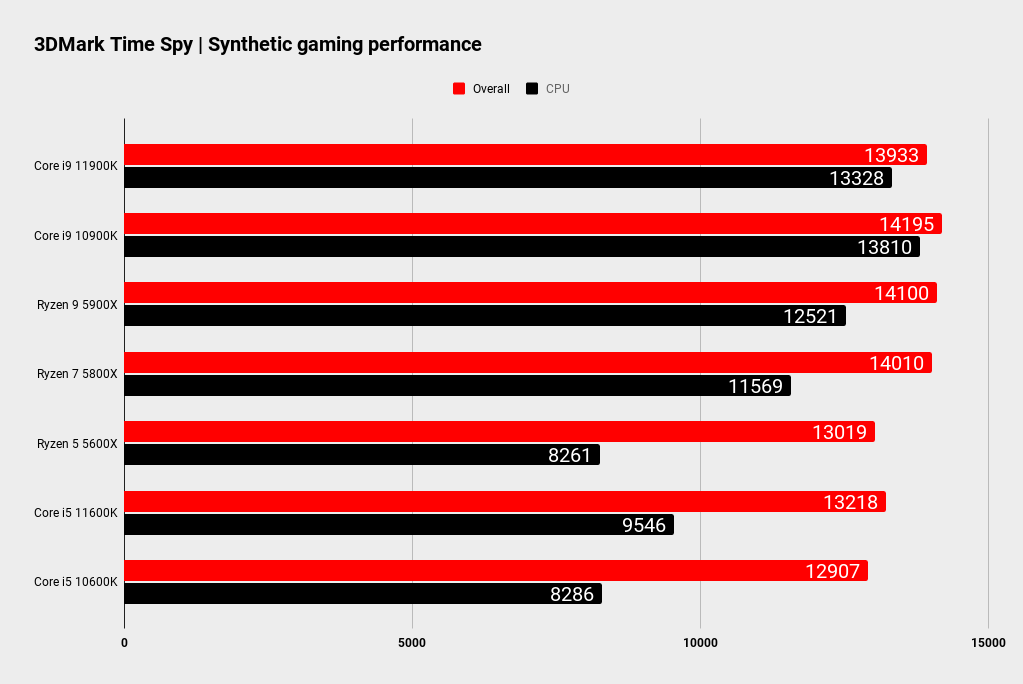
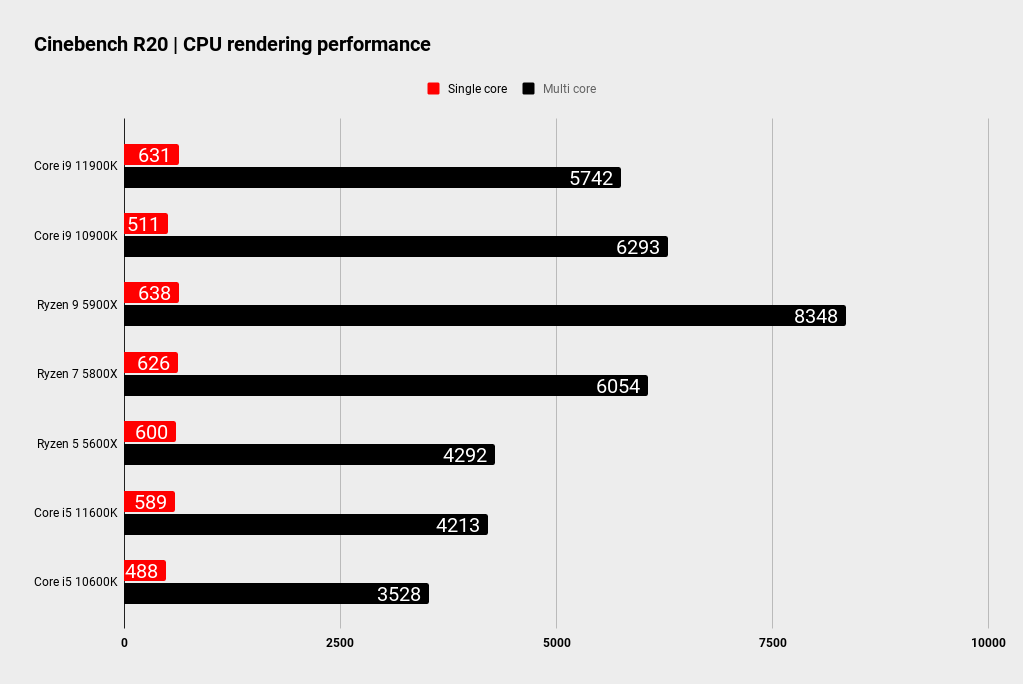
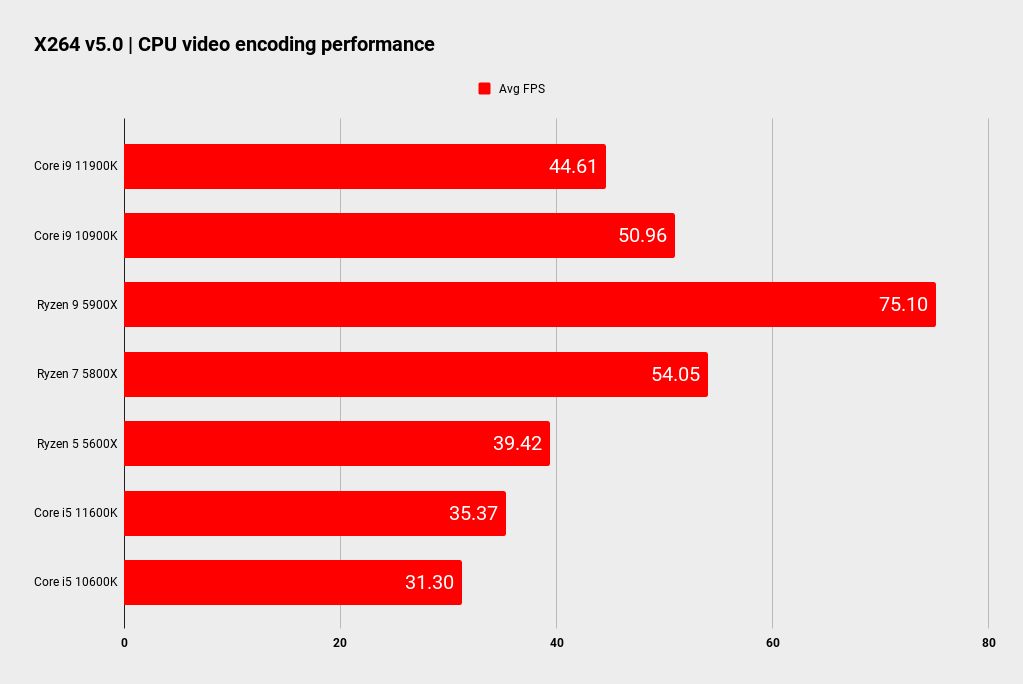
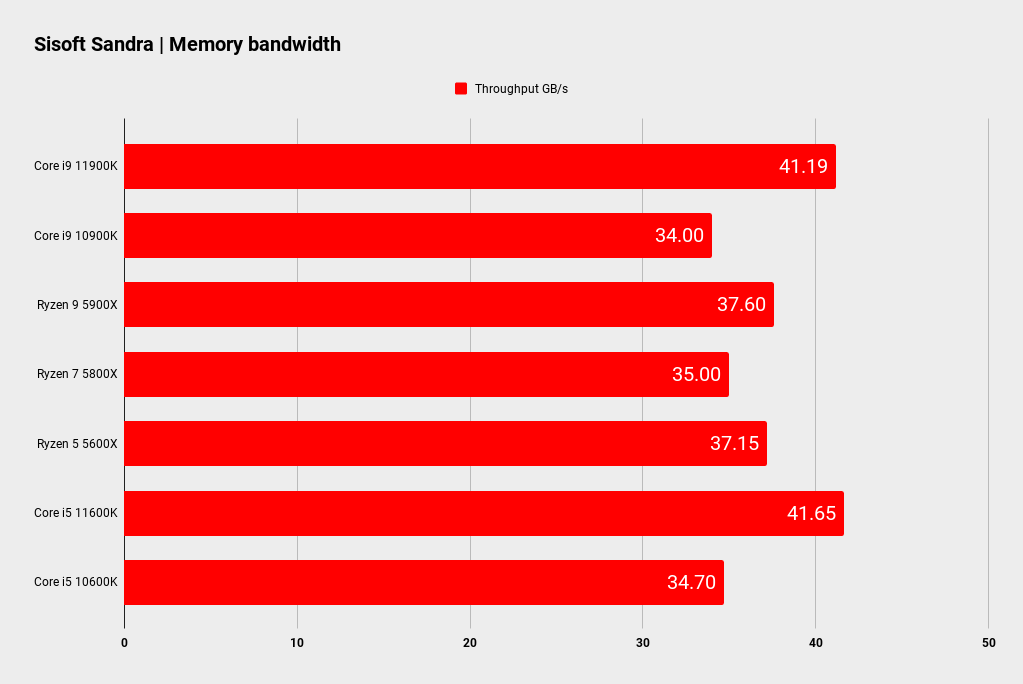
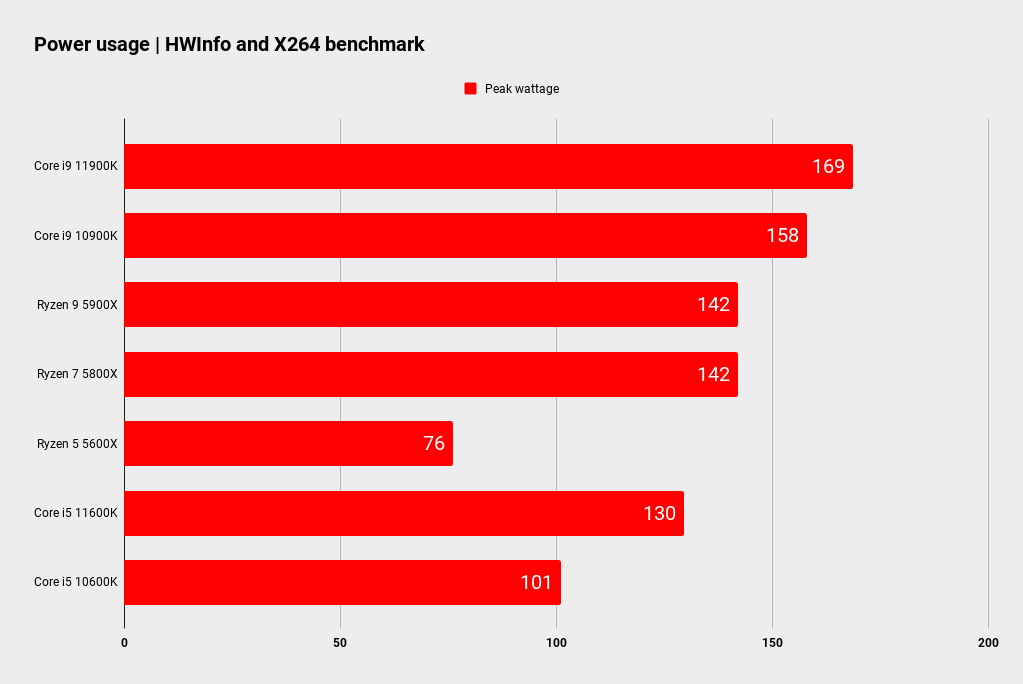
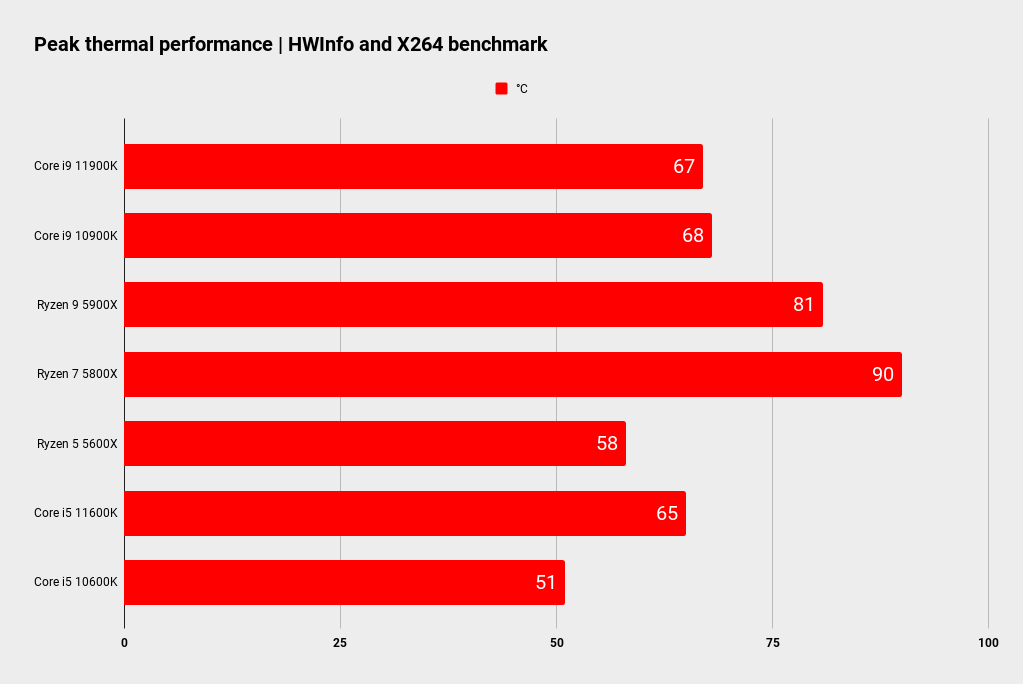
PC Gamer test rig
Intel motherboard: Asus ROG Maximus XIII Hero
Chipset: Z590
AMD motherboard: Gigabyte X570 Aorus Maestro
Memory: Corsair Vengeance RGB Pro 32GB @ DDR4-3200
GPU: Nvidia RTX 2080 Ti
Storage: 2TB Kioxia Exceria Plus
C.P.U. Cooler: Corsair H100i RGB Pro
PSU: NZXT 850W
Anatomy: DimasTech Miniskirt V2
Monitor: Philips Momentum 558M1RY
And that does speak for to the architectural advance the Sunny Cove back-port offers. That was something we tested by by artificial means levelling the playing playing field and locking both the 10900K and 11900K chips at 5GHz and with eight cores fighting.
We only sawing machine an 18 percent IPC increase from a single Congress of Racial Equality Cinebench R20 run. And that absolutely does not translate to games, with game public presentation seeing in general far less than a 6 per centum increase past virtue of the update to Cypress Cove.
Power is the fizzling Thomas Alva Edison elephant in the room, however. The Cypress Cove back-port wine, atomic number 3 I alluded to earlier, is incredibly thirsty when it comes to its big businessman requirements. If you leave the criterional world power limits in situ then the Core i9 11900K runs with 19 percent higher power levels than the 12-core AMD chip, and if you remove those power cuffs the delta jumps to 80 percent higher.
What approximately overclocking? Yeah, that's what I'd like to know overly
And what some the shift to PCIe 4.0 support? Decently now, that's a bit of a struggle. Ahead of the release, with the Asus motherboard BIOS Intel supplied for the Maximus XIII Hero sandwich, the SSD operation of Gen4 drives seems pretty far off the level set by AMD's Ryzen 5000-series. Information technology's possible that the synthetic benchmarks we use aren't working utterly with the new Intel platform ahead of release, but AS SSD and ATTO are healthy below where the Sami Sabrent Eruca vesicaria sativ 4.0 Plus drive performed on Zen 3.
The PCMark 10 storage tests, however, do show an improvement for Intel, as does the straight 30GB file copy trial run. The game level payload time benchmark, exploitation the FFXIV: Shadowbringer test, however, highlights a dip. Which to believe? To be honest, this seems suchlike the nearly formative set out of the platform, and I feel like the SSD performance solitary is likely to change a lot complete the next few months.
What about overclocking? Yea, that's what I'd like to know too. I got nothing out of my sample. Where I could get the Core i9 10900K comfortably running with a 5.3GHz all-core clock speed by undervolting it, and flatbottom a little flakier at 5.4GHz, this Rocket Lake chip is having no of it.
Crashes surgery abruptly truculent power limits kick in, even when the shackles are purportedly cancelled. Undervolting doesn't help, and I think this is something I'm going to have to revisit a a couple of BIOS updates out the line.
Analysis
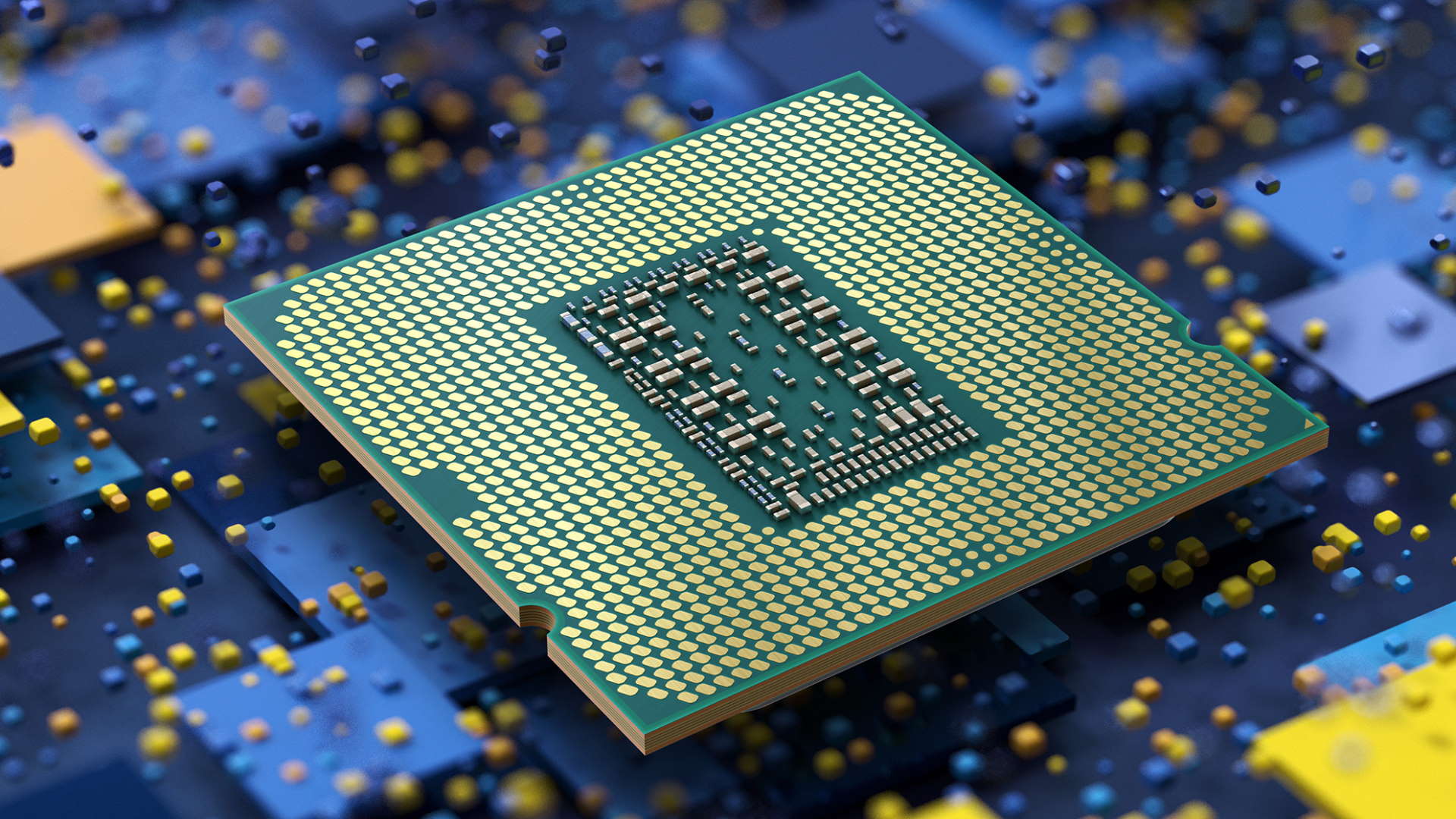
What does the Intel Core i9 11900K mean for PC gaming?
The Pith i9 11900K seems to exist solely so Intel fanny tell people it has the world's fastest play central processing unit again. Our carrying out metrics Doctor of Osteopathy bear that claim out, but the numbers are only sensible in Intel's party favor compared to our loved AMD chip, the Ryzen 9 5900X. That means game performance can't really Be a defining factor in when the time comes to choose your next CPU.
That only really works if everything else is equal, and that's not the case with this generation. Certainly, it's bully for Pine Tree State to recommend the Core i9 11900K purely happening the back of its weak gaming performance lead considering the breadth of platform that AMD presently offers.
The only scramble for the red team, and the one site where Intel mightiness be able to gather up a little positivity just about Rocket Lake, is in the fact that the Ryzen 9 5900X has been in mighty finite supply for much of its aliveness. Everything in PC gaming has been in short supplying information technology seems, though in processor terms things have been nowhere A sticky A in the graphics card market, and on that point are definite signs of a recovery for the other Zen 3 CPU stocks.
The mighty mainstream hex-substance Ryzen 5 5600X is back up on sales event again at $350 and the eight-core Ryzen 7 5800X is in gillyflower too at $490. If the 12-nitty-gritty, $550 Ryzen 9 5900X was available IT would 100 per centum represent the CPU to beat, something the Core i9 11900K only does by a hairsbreadth in gaming.
But it's not available, and so what about compared to the eight-core Ryzen 7 5800X? That's got a similar level of gross processing functioning, if not a meet more, and is roughly on par when it comes to gaming excessively, if not a unimportant frown. It is a lot cheaper though, comes with well-lined PCIe 4.0 support across the entire platform of CPU and chipset, and isn't going to be quite so demanding of your PSU for full-fat performance.
Thusly, that still feels alike a many reasonable chip to chase than the newly released Rocket Lake processors.
What if you need a petite more at the high-death though? What if you lust the promise the extra essence count of the Ryzen 9 5900X offered, but can't snuff it all the way of life improving to the now ludicrously costly Ryzen 9 5950X? This is where Intel has a shot, and in part that's thanks to Garden rocket Lake.
Because the new Intel 11th Gen chips have been new minted the older 10th Gen CPUs, which are still in pretty healthy line of descent thanks to a genuine AMD unconventional eve out demand, are getable for a great price now. The Congress of Racial Equality i9 10900F, a ten-core, 20-thread chip with a high clock speed up, is the same $350 as the six-meat, 12-thread Ryzen 5 5600X.
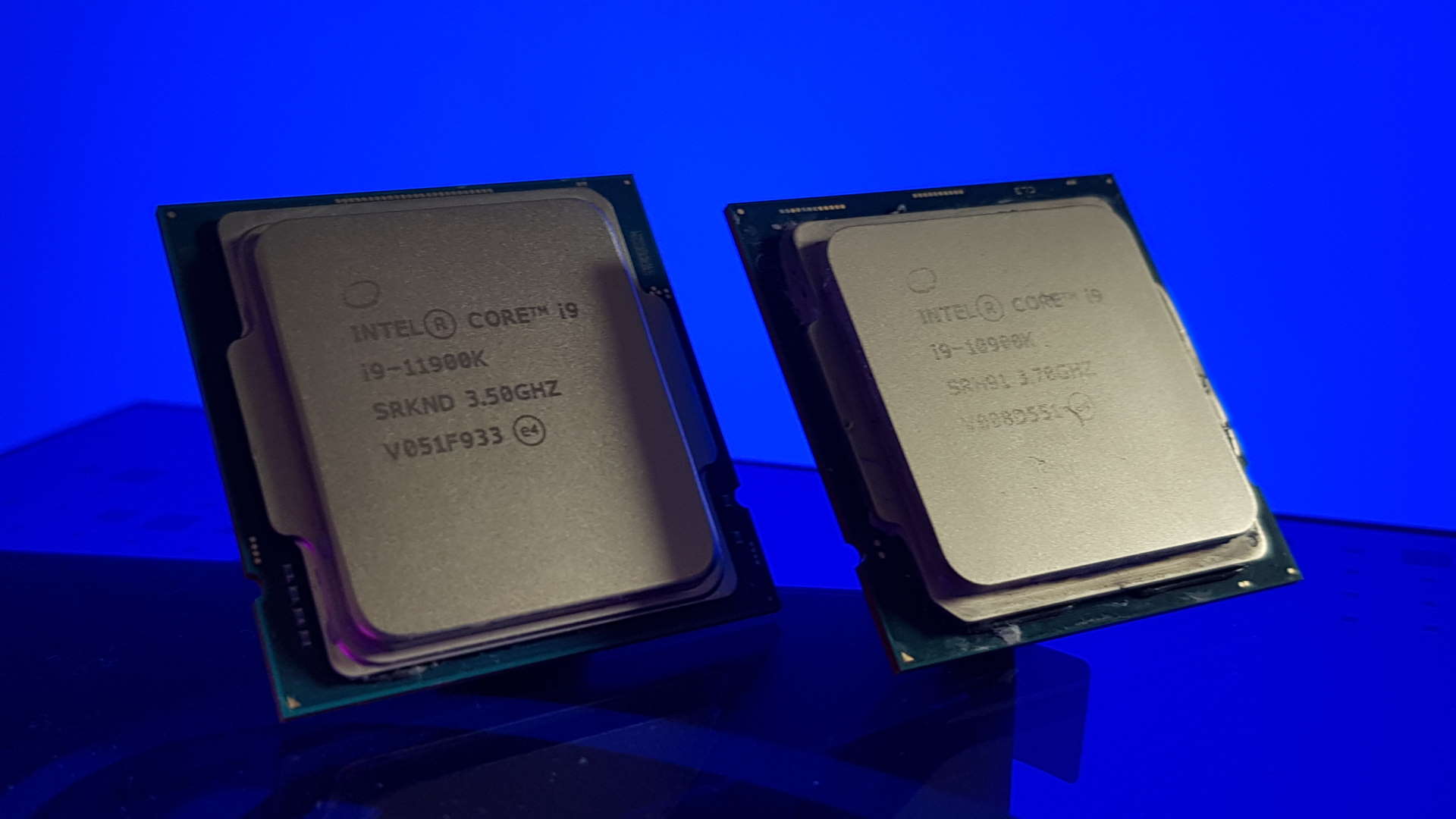
It still feels like in that location's nary place for Rocket Lake at the high end, though. Honestly, it's a good thing the company timed its big Intel Unleashed consequence before the release of these 11th Gen desktop chips because based on the Nub i9 11900K you'd be forgiven for looking at Intel as though it had completely lost its room. I'd surely have less hope it could find a path rearward without Pat Gelsinger's reassured tonic the other twenty-four hour period.
Rocket Lake brings nothing new to the table for all its smart retrograde engineering
Back down-porting its 10nm architecture to tantrum with its abloom 14nm manufacturing prowess credibly seemed like a smart whorl of the dice when it was first mooted, but the reality of that decision has discovered a flagship CPU that offers a solution to a job that doesn't be for anyone but Intel. It's Intel that needful a chip to catch or cadence AMD's rejuvenated Zen 3 gaming metrics, not United States.
Comet Lake trades blows with AMD, and we've unwritten astir how little impact the CPU has on frame rates in true terms. And so either of the 10th Gen or 5000-series chips wish deliver along those counts. So Projectile Lake brings nothing new to the put of for all its bright retrograde engineering.
Apart from, that is, lower down the lot. Back in the ahead time, the farsighted, long ago, when Intel was dominant, we would laud the power of the Core i7 (then the top of the line) merely advocate the Core i5 American Samoa the one just about gamers should go for. Now the Core i5 is the only Rocket Lake anyone should go game for.
That's a chip which improves on its forbear on every level, comes in at the right price, and generally tops its AMD hex-core equivalent in the dicker.
The part I still don't really understand is wherefore Tiger Lake itself wasn't an option. Was it simply down to the loudness of steep-operation 10nm chips that it would motivation to get ready to fulfil both the demands of play laptop and desktop users? Could Intel not commi its 10nm fabs to deliver all it required? Or was there some specified reason it had to get a newborn chip generation out at the start of year?
I guess the noesis that Alder tree Lake was en route at the end of 2021 meant any other release timing would prominence too close into that launch, so if Intel could rely on delivering the 10nm Tiger Lake computer architecture to desktops, but not until the Summer, maybe that's why IT was disconnected the cards. It's certainly not because the silicon can't hit the time speeds background users demand, as the promised Tiger Lake H CPUs are set to drop into laptop solid ground with equal to eight cores, 16 threads and 5GHz+ frequencies.
Those sound like beautiful upstanding numbers for an 11th Gen desktop chip if you ask me, and would offer an IPC bump even over Cypress Cove, would sit in a littler package, and be far more powerfulness-efficient than Rocket Lake is equal to of.
For me, taking the backwards step of releasing a Core i9 with fewer cores than the last contemporaries, merely for a higher price, exemplifies that traditional Intel hubris, making it seem as though the company has learned nothing from the inexorable rise of Ryzen. If Intel had engulfed its pride, eschewed the i9 tier just for Rocket Lake, and plainly made this its $399 octa-core i7, it would have been a far to a greater extent welcome addition to the market.
Or else, it's burdened the i9 with an unreasonable price tag and hobbled the i7.
Verdict
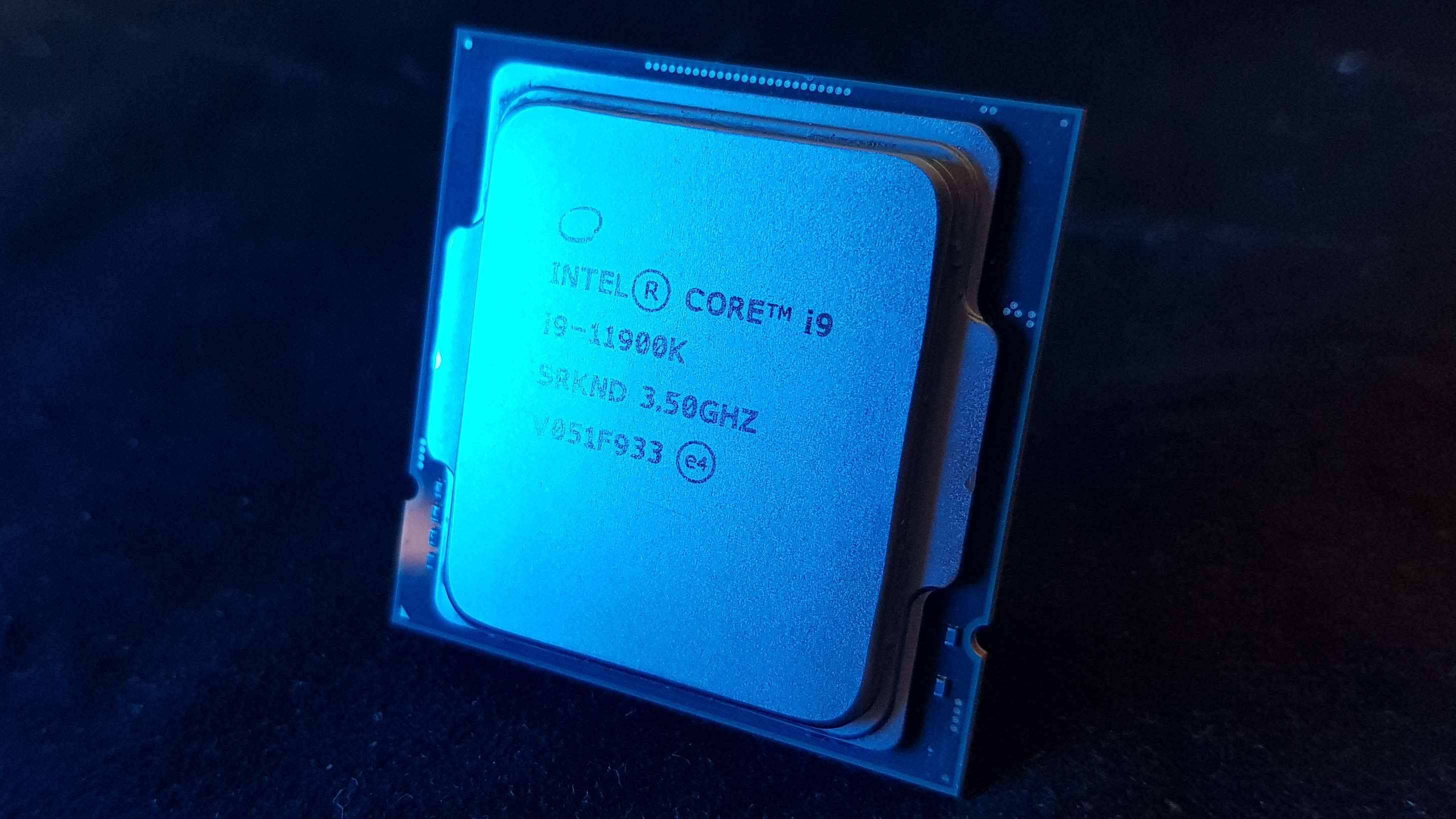
Should you buy the Intel Heart and soul i9 11900K?
The Core i9 11900K as the world's quickest gaming central processing unit is a fine title to confront to your investors, and maybe even aid to temporarily add a couple of points to your bottom wrinkle, but for us PC gamers IT's become an almost irrelevant claim. With your GPU having then much many impact on gambling frame rates than your CPU, these days having the domain's quickest gaming processor feels a little like being able to tell you've got the lightest SSD operating theatre the most tight graphics lineup in your background rig.
In the closing, for gaming, your CPU really exactly needs to follow good plenty to allow your nontextual matter card to flex, and that substance your decision comes down to what else a chip can offer. And in those terms, AMD's Ryzen 5000-series processors have far more in their lockers.
The Core i9 11900K only has few frame rate wins to show for itself. It's not tangibly faster than the last-gen i9—in fact, it's notably slower in multithreaded processing ability—has a weaker eyeglasses sheet, costs more, and is far much thirsty. And Comet Lake itself was already beautiful hard-to-please on that front.
As the first PCIe 4.0 compatible Intel political platform, it's also a disappointment as it can only offer support from the CPU itself, not the chipset. And even so the public presentation looks jolly blue right now.
On the AMD side, all the same, you have options for greater core counts, effectively the aforesaid level of gaming operation (what's a few FPS between friends?), a more mature PCIe 4.0 enabled platform, and more affordable eight-core chips to offer. And when the Ryzen 9 5900X comes back into stock, AMD has the prizewinning well-rounded CPU offer there is.
The answer then is: No. You shouldn't buy a Core i9 11900K, because there are objectively better chips on provide from AMD or even Intel's previous generation.
Intel Core i9 11900K
A startlingly unnecessary CPU, one that only serves Intel's own designs and non actual PC gamers. Its specs feel weaker than the last-gen flagship, it's more expensive, and has a thirstier core at its 14nm middle.
Source: https://www.pcgamer.com/intel-rocket-lake-release-date-specs-price-performance/
Posted by: fullerarinue.blogspot.com



0 Response to "Intel Core i9 11900K review | PC Gamer - fullerarinue"
Post a Comment